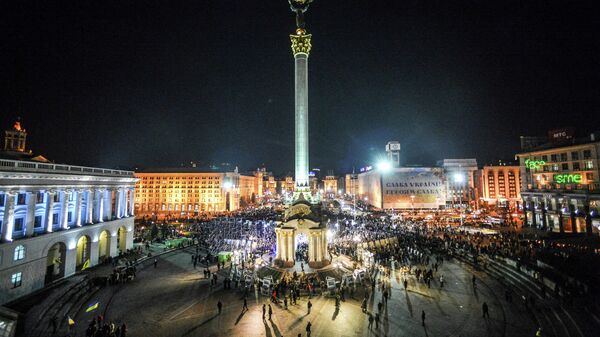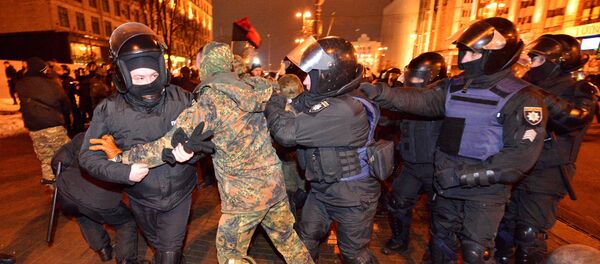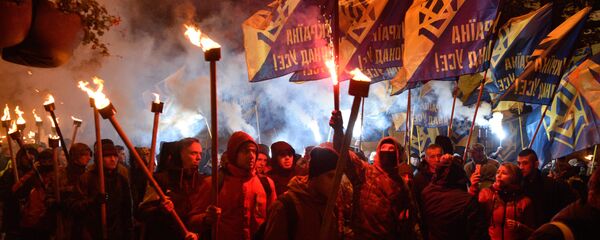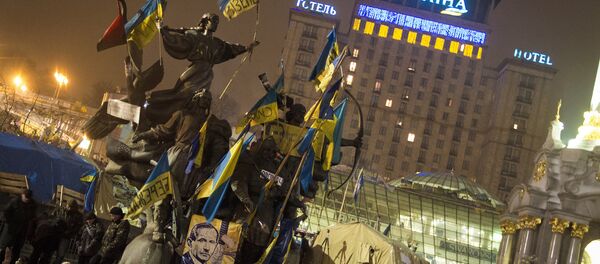The deal will cost Polish budget $7.6 billion, and it is seen as a brainchild of the controversial Polish defense minister Antoni Macierewicz. He had been lobbying the project for years, saying quite openly that the Patriot missiles will be directed at Russian territory, minimizing the “threat” purportedly coming from there.
A Miniater With Useful Madness
Macierewicz claimed that Tusk and the future president of Poland, Bronislaw Komorowski, had a secret agreement with Russians, who deliberately made the normal landing of the presidential liner in the Russian city of Smolensk impossible or even exploded the plane in the air (the latter being one of the “versions” pushed by an investigative commission headed by Macierewicz). Both versions were dismissed by the experts of the Russo-Polish team which investigated the crash in 2010, as well as by the European policy bodies, which sided with Tusk in his conflict with the ruling party in Poland.
Adam Michnik, the editor-in-chief of the pro-EU Gazeta Wyborcza daily, the wealthiest news organization in the country, at a recent meeting with readers called Macierewicz “a mad guy who, however, knows where the jars with jam are located.”
And, one could add, these are hefty jars: $7.6 billion is a huge sum for Poland, a medium-sized European country of 38 million, ruled in shifts by the hardline nationalist PiS party (now in power) and the pro-EU Civic Platform (PO). Both parties have been dominating the political landscape for more than 10 years. Both parties are in a state of a permanent nasty conflict between each other, but in foreign policy both embrace radically anti-Russian positions.
Consulates in Danger
One of the cornerstones of this “bipartisan Russophobia” has been PO’s and PiS’ active support for the 2014 Maidan coup in Ukraine and the anti-Russian regime which that coup spawned in Kiev.
The Polish consulates all over Ukraine were subsequently shut down and put their operations on hold until the supposedly “fraternal” Ukrainian state headed by the supposed fan of Poland, president Petro Poroshenko, guarantees the security of Polish diplomats.
The Ukrainian interior minister Arsen Avakov announced “normalization” of the security situation on Friday morning already, inviting Poles to get back to business as usual, but the Polish side preferred to keep its consulates shut for good.
Quite expectedly, both the Polish and Ukrainian politicians directed their anger and suspicions at Russia, saying that Moscow was behind the bazooka incident, even though no evidence of the so called “Russian connection” was produced. Hours after the incident, Russia was blamed for the shooting by the Ukrainian ambassador in Poland Andrei Deshitsa and by just about all the other Ukrainian officials commenting on the incident. Their Polish colleagues did not lag far behind, with PO’s bigwigs showing no lesser anti-Russian zeal than their colleagues in PiS. Jaroslaw Gowin, a former minister in PO’s government and for many years the number two person in PO, also supported the “Russian connection” theory. However, the only argument produced in support of this theory is the perception by both Ukrainian and Polish officials of Russia as a country willing to see a rift between Poland and Ukraine.
The former Polish prime minister Leszek Miller (formerly the leader of the social-democratic SLD party) was just about the only Polish politician to be ironic about the Russian connection paranoia: “In Lutsk, where the Polish consulate was fired upon, someone also ransacked the offices of a Russian bank. Obviously, that awful Kremlin is operating in doubles and triples,” Miller wrote in his Twitter account.
The Ugly Truth About Uktranationalists
Yuri Bondarenko, the head of the Moscow-based Center for Russo-Polish Dialogue and Accord, was equally ironic about the theory of “Russian connection,” accusing the Ukrainian ultra-right activists of shooting at the Polish consulate.
“I have an impression that Polish officials are unwilling to push the version about the “Russian provocation” any further, because they know the true value of the Ukrainian officials’ statements on this affair and some previous ones,” Bondarenko said in an interview to Sputnik. “When in March the offices of the Russian banks in Ukraine were blockaded for weeks by the Ukrainian ultranationalists from the National Corps group, with nasty inscriptions made on the banks’ walls and entrances blocked by improvised brick walls, Ukrainian officials also said it was all a Russian provocation,” Bondarenko commented.
As a result of the blockade by ultranationalist activists, Russia’s Sberbank was forced to sell its assets in Ukraine to a consortium of Latvian and Belarusian investors.
Despite all the talk about the “Russian provocations” and vows to preserve “Ukrainian-Polish unity” against Russia, the truth about the deep conflict between the Ukrainian ultranationalists and Poland becomes impossible to deny – even in Warsaw. Grzegorz Schetyna, one of PO’s leaders and the former Polish foreign minister in Donald Tusk’s government, called the Ukrainian-Polish relations “the worst in the last 20 years,” according to the Polish news site Kresy.pl.
The Far Right Shapes Historical Narratives
The situation is made worse by the fact that the Ukrainian ultranationalists have shown their ability to dictate their terms to the government and the parliament in Kiev, where they have powerful lobbyists and where the ultranationalist narrative has been dominant in the media since the times of the Polish-supported Maidan in 2014.
This conflict of two nationalisms periodically spills into the open during the Polish-Ukrainian arguments over the events of the World War II and its immediate aftermath. Poroshenko’s regime and ultranationalist groups in Ukraine lionize the pro-Hitler Ukrainian nationalist groups of the 1940s which slaughtered tens of thousands of Poles in Volyn and Galicia in 1943-1944, in an attempt to make Ukraine “ethnically clean.”
Suspicious Impunity and the Sad Truth
Polish public opinion was even more angered by acts of vandalism against the monuments to Polish victims of Ukrainian nationalists and German Nazis on the territory of Ukraine. Polish monuments and even graves of these victims were recently vandalized in Lvov (Western Ukraine) and in the village of Guta Peniatska in Lvov region. Before World War II, Lvov had a large Polish population and was seen as an important center of Polish culture, on the par with Warsaw and Krakow.
After all of these incidents of vandalism, the government in Kiev expressed its regrets and blamed “the third party” (a euphemism for Russia), but no culprits were ever found and no trials held. These facts are not stressed by the Polish authorities or the media, but they are not missed by the Polish readers and television viewers.
“Has anyone heard of the Ukrainian security service actually arresting one of these so called Russian provocateurs?” a reader nicknamed Poraniony wrote in his reaction to an article on a right-wing Polish news site Wpolityce.pl “This has been going on for two years now. In Ukraine, someone is attacking our consulates, someone is exploding monuments to murdered Poles, someone is destroying our memorial sites and cemeteries. Not only the perpetrators are not punished, they are not even named (with the exception of that universal scapegoat, Vladimir Putin).”
The views expressed in this article are solely those of the author and do not necessarily reflect the official position of Sputnik.







